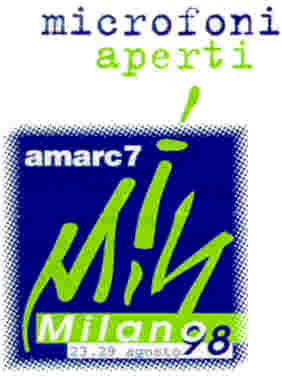amarc-1
[Date Prev][Date Next][Thread Prev][Thread Next][Date Index][Thread Index]
Re: <amarc-1> telecoms & strategy (was: A different concern)
Ahoj - catching up, so a bit late... reacting on Kole and Lyn
By the way - both of you thanks for pushing this discussion forward
- i was a bit concerned about the first - "oldie" - message of Lyn
(it sounded a bit fatalistic ;-) ), but you showed your other side
later :-))))))
Bram summarised:
> The mega-mergers we read about, then, are very much about telecoms giants
> who're protecting their turf. What space for the right to communicate in
> all of these turf wars? The World Congress proposal called for civil
> society representatives at the International Telecommunications Union. Lyn
> has suggested that we open dialogue with the corporations who already sit
> around decision-making tables, formally and informally -- at the ITU, or at
> the World Trade Organization which is crowding the ITU's political turf.
>
> So the question comes: are these good strategies? Are they useful? And if
> so, how do we go about making them happen?
I don't think these should be the only strategies. I would compare
them with the strategies take by "critical shareholders" in - for
instance - big chemical corporations and (like the yanks say:
life-science - but i prefer the clearer) genetic manipulation
companies and energy companies - all MNCs.. I think these people *do*
play an important role, and indeed *do* have successes. But they are
not the only keyfactors. Neither are critical people within these
companies. Neither are, by the way, consumers or legislators.... It
is the organic playing together of all these that have on one side
made SHELL critical about general Abacha of Nigeria - but also
invoked the reaction of hiring specialised PR agencies in tackling
problems with environmental and human rights movements (like the PR
agency Burston Marsellers), which only strengthened companies like
Exxon and Monsanto.
I tihnk that an important force against the arrogance of these
companies comes from the people and groups that set an alternative
and for the rest just let these MNCs be MNCs - knowing that
resistance against them is necessary, but not always the most
effectfull work.
The alternative energy movement and the organic agriculture movement
are important forces against the above mentioned MNCs....
I think that one of the strategies should be in setting up (where
they don't exist yet) and/or strengthen independent communication
structures. Induce co-operation in that area, where sprouts of
competition come up (like Lyn proposed), and so on.... How many of
you are connected to commercial communication service providers - and
thus making yourself vulnarable for the dangers you describe? - and
thus supporting the monopolies you critisize?
I ask this question with - of course - some self interest. I see it
happening more and more often, that NGOs, critical researchers and so
on reduce the whole question of communication to "connectivitiy" to
Internet. They join the cheapest commercial provider. But they also
cut themselves out of the synergetic effects of joining forces as
critical people and organisations and create safeguards against the
dangers they all talk about.
APC joins already members and partners - all progressive oriented
commmunication service providers - in more than half of the countries
in the world. Besides that there are thousands of others with close
links to the NGO world.
I think the question is not so much about whether we should not use
or can use MS Word or MS NT server (a discussion recently very hot
in germany).... the question is in the communication infrastructure,
setting up strategic use of these tools... We must develop, but much
more important, let organically grow strategies into that direction.
And i would add - rather than making declarations, world conferences
and so on.... Rio 92 has shown the value of the paper.... yes, it
sets some direction, but it is not the paper that creates the change
- it's the people that push for it...
jan haverkamp
ECONNECT
Praha - Czech Republic
|
| Jan Haverkamp
| ECONNECT
| computer network for not-for-profit citizens organizations
| member of the Association for Progressive Communication (APC)
| Ceskomalinska 23
| tel.: +420.2.24311780
| fax: +420.2.24317892|
|
| WWW: http://www.ecn.cz, http://www.apc.org
| e-mail: [email protected]
|
++++++++++++++++++++++++++++++++++
AMARC 7 Foro Virtual Forum Virtuel
http://www.amarc.org/amarc7
to unsubscribe / pour se desabonner / para abandonar :
e-mail "unsubscribe amarc-1 " to: [email protected]
Tecnical realisation, scripting and archiving: Worldcom
Foundation
English: [Virtual
Forum Index] [Search
Forum archives]
Français: [Index
du Forum Virtuel] [Chercher
dans les archives du Forum]
Español: [Índice
del Foro Virtual] [Buscar
en los archivos del Foro]
